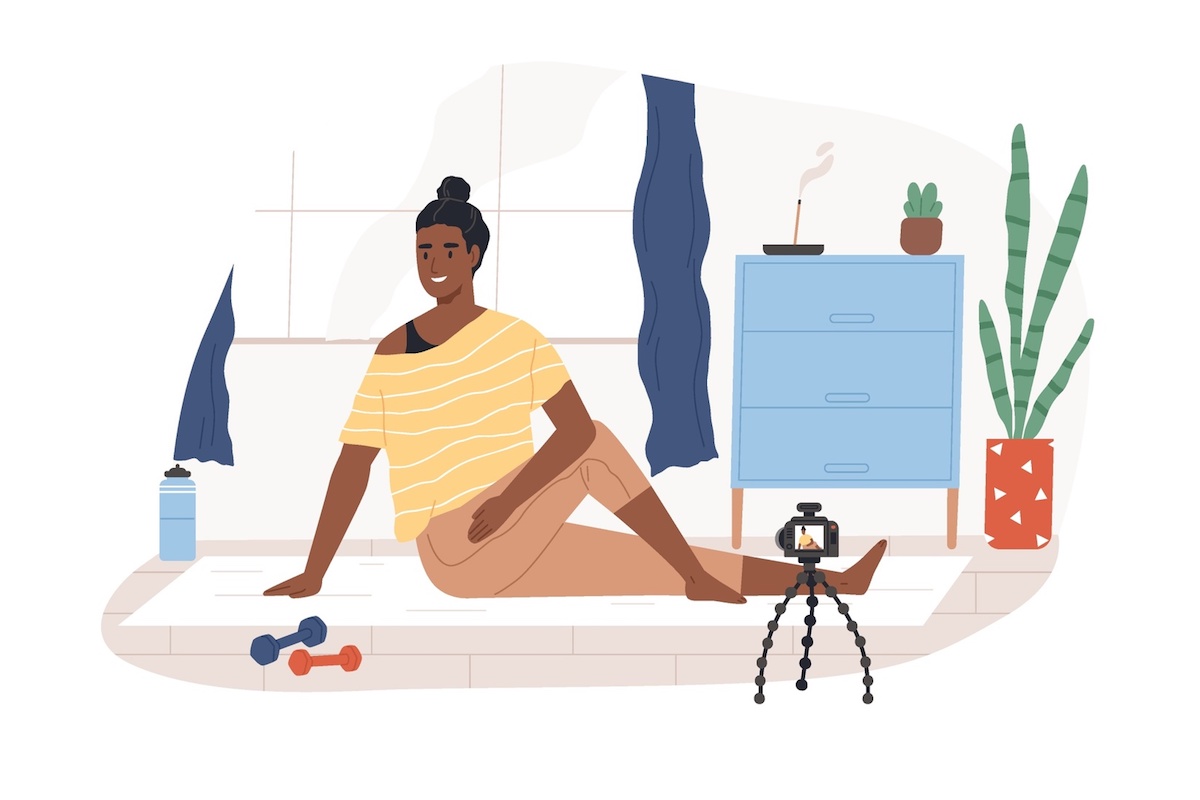Meet the Creators Turning Tiktok Into a No-Judgement Health & Fitness Hub

It’s hard to spend more than a few minutes on social media before bumping into something that originated from TikTok. Created in 2018, the short-form video-sharing app has accelerated during the past year — typical creators can include comedians, musicians, Fortune 500 companies, media publications, celebrities and, to whom the platform owes its popularity, millions of Gen-Z users — and has quickly disrupted the social media landscape with around a billion total users.
Take a scroll through TikTok’s algorithm-based ‘For You’ page and you’ll notice that there’s no one-size-fits-all approach to creating content that excels on the platform. In a few downward swipes, you can go from a Kenyan furniture store to pro cyclists in Colombia, a calisthenics expert in Oregon to Gordon Ramsay’s latest, expletive-ridden critique of a follower’s steak tartare.
One such community interacting with this new audience are fitness, health and wellness enthusiasts, known collectively as ‘#FitTok’, who are using the platform to create engaging content and actionable advice for younger people looking to make positive change.
OK, But Why TikTok?
Popular #FitTok content can take many forms across the TikTok landscape, including beginner-friendly yoga, protein recipe hacks, no-BS bodybuilding advice and even insights into high-performance athletes or celebrities.
Through educational initiatives like #LearnOnTikTok — which positions the app as a “platform not only for entertainment but creative, bite-sized and joyful learning” — TikTok promotes itself as a safe space for anyone looking to absorb or share advice from others in a similar mindset and, for those creating the content, a way of making measurable change and disrupting questionable fitness advice on social media.
“My whole business is built around simplifying the complex ideas that surround health and fitness and TikTok gives the perfect platform serving bite-sized 15-60 second pieces of content…if I can simplify a complex idea enough to communicate it in a 60-second video, I think I’ve done my job well,” explains Tony Coffey, who currently shares his knowledge to 241,000 active followers. “[TikTok] has given me a tremendous feeling of love being able to reach so many people and help give them the confidence and understanding in their own health.”
As opposed to Instagram, where the original explosion of user-first fitness content occurred and has since caught heat for negative body image connotations, TikTok works directly with the ‘creators’ that use it as a platform for learning and for action, instead of solely positioning itself as an experiential, moment-sharing app.
60 percent of TikTok’s audience are in the ‘Gen-Z’ age range of 16 to 24-years-old, an impressionable age where social pressure is arguably at its highest. For Coffey, “being as positive and supporting as I possibly can”, “not passing judgement” and knowing that “it’s okay to mess up and not be judged” is primary to his mission statement, knowing that “people want to learn and understand how their bodies work, not just see a super fit person working out shirtless for the 1000th time.”
It’s Not Just About Workouts…
Within the walls of #FitTok there’s also plenty of other creators making noise outside of fitness advice. Jalal Sameja — @jalalsamfit to his 769,000 followers — has made waves with healthy, easy-to-follow and engaging recipe clips. “Main aim is to provide value and help people live a healthier lifestyle,” he says. “The amount of people that find my content helpful is the best thing and being able to reach a wider audience [through TikTok] was a no-brainer, as I love cooking healthy meals.”
For Lindsay Fleming, a Licensed Professional Counselor (LPC) for children and teenagers in Chicago, TikTok provided a direct line to her community during the outset of the pandemic in 2020.
“A few of my group members reached out explaining how they missed the group and felt lonely. I decided to post on TikTok to help my community manage the pandemic,” she explains, having since brought in 424,000 followers who regularly watch her content that can include ADHD struggles, trauma relief, coping with toxic relationships and eating disorders.
“It has helped me understand many of my clients’ worlds more. I tend to know what is going on in the social media world and can relate to a lot of their interests. I’m also aware of problematic and triggering things that are occurring on social media as well.”
One such topic, inevitably, was the almost instant shift from physical interaction to virtual when social distancing measures were introduced. “My most popular post was when I made a video about the difficulties of virtual therapy…it was relatable because many people, like myself, were struggling with the transition to virtual sessions,” she says. “Many teens struggled to find privacy and felt uncomfortable talking in their homes for fear someone would overhear.”
In the world of TikTok then there was help to be found, buoyed by initiatives like TikTok’s “wellbeing warriors” network, an Avengers-style band of creators assembled to “help our TikTok community weather the storm” by offering mental health and wellbeing advice, sharing experiences and providing impactful content.
Moving Forward
Typically, TikTok serves as a destination app. Users, often those who feel underserved on the other primary social media apps, open it up and scroll through to be entertained without visiting anywhere else. Conversely, by directly approaching their audience, #FitTok creators are changing that narrative, by encouraging its user base to take the lessons learned and apply them IRL.
“It’s important to meet people where they are at,” explains Fleming. “Instead of trying to force a teen to read a book or go to a website, we are right there for them to find… Since I work with this age range every day in my private practice it was pretty natural for me. I discussed patterns I see in my work and by what people comment on my videos and create for my community.”
It’s this wider community that #FitTok continues to serve on a minute-by-minute basis, with thousands of videos being posted daily. That they make a tangible, real-world difference beyond 60 seconds of entertainment is enough for creators like Coffey, Fleming, and Sameja to keep posting. “Health is one of the biggest confusions in an individual’s life,” says Coffey. “Yet, it should be something everyone should understand.”


















